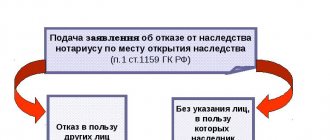State duty for inheritance: interest and amount
If previously citizens were required to pay a tax in order to enter into an inheritance, now it is only payment of a state fee for a specific notarial function - issuing a document indicating the right to own an inheritance. Produced at the end of the hereditary process.
A difference is revealed in the amount provided for payment of state duty. It is based on two fundamental indicators: the degree of closeness of the heir to the testator and the value of the inheritance received. Both indicators should be taken into account by both the heir and the notary representative.
For blood relatives
For close relatives, a reduced coefficient for determining the state duty is provided - 0.3% of the estimated (according to an independent examination) value of the inherited property. At the same time, there is an actual listing of relatives suitable for this role.
Who pays the reduced state duty when entering into an inheritance after the death of the testator:
- father mother;
- children;
- surviving husband/wife;
- brother/sister.
As for points 1 and 2, it does not matter whether these people are relatives or adoptive of the deceased. At the same time, it is worth separating the concept of adoption and guardianship under a foster family agreement. Equality of rights is ensured exclusively in the first case. The spouses must be official, which is confirmed by a marriage certificate.
These persons can be designated as representatives of the first and second priority in the distribution of inheritance according to the law. But here this information is not so important. Kinship is also taken into account during the testamentary division of the estate. These same citizens have the right to completely avoid paying state fees when entering into an inheritance.
For other heirs
It is worth knowing what percentage is charged to persons who are not blood relatives - this is an increased state duty rate of 0.6% of the price of the inheritance, determined during a specialized assessment.
Features of receiving an inheritance from abroad
If the inherited property is located abroad of the Russian Federation, the amount of the state duty is fixed and equal to the established minimum wage. Which is 7800 rubles. This is the cost of an inheritance certificate in Russia, but many countries have their own characteristics, which in some cases will require additional payments. Let's look at a few examples:
- Offshore zones. There is no inheritance tax.
- Great Britain . The amount of tax is influenced by the value of the property received as an inheritance (for a price of more than 325 thousand €, the state requires 40%).
- France . The amount of payment depends on the degree of relationship and the value of the inheritance. Close relatives will pay 40%, and distant relatives 60%.
- Spain . The tax depends on the value of the object. For property worth €500,000 they will require 20%, and for properties worth €150,000 - only 9%.
- Poland . From 3 to 20% depending on the degree of relationship.
But if you become an heir to property in Israel, the USA or Switzerland, then you do not need to pay any taxes. In the first country they are not provided for at all, but in the case of the other two, existing international agreements come into force.
Property located abroad will be assessed by local appraisal companies. The price range for such services is very wide: from 200 € to several thousand.
What is included in additional services
Technical and legal support is included in notary services taxed at the state rate. This includes consultations and all kinds of operations on drawing up, copying and printing documents, etc.
How is their value determined?
The price tag for a notary service is determined by state tariffs for purely notarial functionality, as well as prices for additional legal and technical services.
As for the fee for entering into an inheritance, the total amount of money that is paid within the framework of a particular inheritance case will depend on the number of persons appearing in it and their status in relation to the deceased.
Privileges
Privileges and concessions, as well as the calculation procedure, are determined by the Tax Code. There are certain categories in the list of inheritances, or objects of inheritance, for which the state duty for the will of an apartment is not paid :
- living quarters where and the testator lived together ;
- bank deposits and pensions, as well as royalties ;
- payments under an insurance if death occurred from an accident at work or under an insurance contract concluded by a military personnel.
The fee is not paid if the deceased was subjected to political repression in any historical period. There are exemptions in other cases - for example, a minor heir , a disabled person of the first and second groups , a person with mental disorders, and this is confirmed by the relevant evidence or documents.
Important! Legal exemption from payment does not mean that there will be no expenses at all for entering into an inheritance. Spouses pay the costs of allocating their share of jointly acquired marital property, but they will have to pay a decent amount for the application and consulting services. Notary services are also paid depending on what actions were taken to establish the right to receive tax privileges.
When registering an inheritance under a will
There are two ways to accept an inheritance: by will and without it by law. When drawing up a testamentary disposition, the author can indicate any person as an heir, as well as independently designate the inheritance transferred to him and its full or partial expression.
Documents for calculating preferential rates, confirming family ties
The preferential category of heirs under the tax code does not pay state duty for inheritance. Applicants for inheritance with a reduced interest rate document their relationship. Only siblings (not cousins), legal spouses, and identified parents and children are counted.
Documents that need to be provided to confirm relationship:
- marriage certificate;
- birth certificate (which is important to confirm the status of the child and parent).
It is more difficult to confirm the relationship between brother and sister, because such information does not appear in the documents. You will have to prove your relationship through your parents and birth certificates. Passports are required to be presented.
Inheritance of an apartment by will
If a will transfers an apartment that was jointly owned by the spouses, then in the absence of a marriage contract or an agreement on the allocation of shares, the heir is issued a certificate indicating half the share of the apartment.
The successor can own the inherited real estate from the moment the inheritance is opened. However, to be able to dispose of property, it is necessary to register ownership with Rosreestr.
There are two ways to accept a bequeathed apartment:
- Submit an application for inheritance.
- Carry out the actual acceptance of the property.
In the first case, ownership of property arises after filing an application for acceptance of inheritance.
When actually accepting an inheritance, it is not necessary to submit an application to enter into the right of inheritance if the successor carries out actions indicating ownership of the real estate. However, subsequently, in order to be able to register ownership of the apartment, it will be necessary to contact a notary and confirm the fact of acceptance of the inheritance in order to issue a certificate.
As grounds, it will be necessary to provide evidence showing that the heir lived with the testator. As well as documents confirming payment of utilities and related to housing maintenance costs, i.e. information confirming that the heir did not renounce the property , but on the contrary had a desire to accept it.
Upon entry into property rights under the law
Inheritance by law involves a queue of groups of successors considered sequentially. The transition to the next category of waiting lists occurs due to the absence of representatives from the previous one. The deceased's dependents receive their share regardless of will or legal division. It is calculated as half of what they would have received in order.
Everyone is allowed to take ownership of property on only one basis, supported by documents. When dividing an inheritance, according to the law, we are talking exclusively about transferring property to blood relatives, so they need to provide documents confirming the level of relationship.
Standard situations: the amount of state duty when entering into an inheritance
The amount of the fee must be determined after the candidacy has been approved by a notary (and sometimes the court) and an application has been written to accept the due share. After the opening of the inheritance, six months pass before those who apply can actually receive personal certificates of the right to inheritance.
Within 6 months, the inheritance is assessed and the state fee is paid. Only after receiving the certificate can you file claims in court and register the property in your name in Rosreestr (also paying the state fee for registering property rights).
What does the payment amount depend on?
There are two basic indicators that determine the amount of state duty. Within each of them, different circumstances and digital variations are possible. Indicators influencing the state duty when entering into an inheritance:
- the cost of the inherited object;
- the percentage calculated from it: 0.3 or 0.6 depending on the position of the heir.
An ordered assessment of an inheritance from independent licensed organizations involves the calculation of market value. The remaining two options are calculated the same in all regions.
What affects the amount of state duty
You can vary the amount of the state duty depending on the status of the heir (close relative and other applicants) and the value of the inheritance. The inventory value is specified in the BTI, the cadastral value in Rosreestr. Market value is determined by the appraiser. The costs of its implementation can be divided equally between the applicants.
The most advantageous in terms of calculating the state duty is the inventory cost. It is reduced several times compared to the market price. However, citizens are recommended to always use the latter, as it can be useful for compensation for a share or for a full division of the inheritance between the persons involved.
Cost of legal services
Entering into inheritance rights is a complex procedure that requires a competent and responsible approach. Ignorance of laws often leads to increased costs for registration. A correct assessment of the value of property will help you save money, and a detailed list of documents will help you avoid delays. To coordinate actions, you need to contact a legal specialist. It will help you understand the following issues:
- whether the heir has the right to the property of the deceased and whether it is worth applying to court to establish inheritance rights;
- whether the costs of entering into an inheritance will exceed the value of the property;
- how to enter into an inheritance if 6 months have passed since the death of the testator;
- what actions should be taken to allocate the marital share of property or the obligatory share to a certain group of persons;
- challenge the will or invalidate it;
- what to do with property that the deceased used, but did not register in his own name during his lifetime;
- what to do with the debts of the testator;
- how to re-register property in your name.
These and other types of services provided by lawyers will save time and not lose what is owed by law. The cost of legal assistance is set individually by each firm and averages:
- legal consultation - from 1000 rubles;
- registration of property inheritance rights - from 25,000 rubles;
- collection of a package of documents required by the court to resolve disputes regarding inheritance of property - from 10,000 rubles;
- collection and presentation of information about all the property of the heir - from 3,000 rubles;
- registration of a certificate of inheritance of property - from 5,000 rubles;
- representing a client, conducting the negotiation process on his behalf - from RUB 15,000;
- representation of interests in court - depending on the number of meetings;
- establishing the right to an obligatory share in an inheritance - from RUB 35,000. +% of the value of the seized property.
The cost of services may vary depending on the complexity of the lawyer’s work and the agreement with the heir.
Categories of persons who are entitled to benefits upon inheritance
In this case, everything is based on the category of benefit that applies to the payment of state duty. Benefits can be regulated by both the Civil and Tax Codes. The results when using them are different. In the first case, the specificity of the calculation is implied, and in the second, it eliminates the need to charge payments.
Categories of beneficiaries who do not need to pay a state fee at the notary when entering into an inheritance:
- blood relatives;
- exempt from state duty.
The list of documents depends on which benefit is applied under the Civil Code or the Tax Code of the Russian Federation. Exemption from payment of state duty is explained by the social vulnerability of persons who do not have a regular income and cannot provide for themselves due to age or illness.
Example: how much does it cost to inherit an apartment?
Let's look at an example of how much the entire procedure for a wife to inherit an apartment and its registration costs.
- Payment for the assessment of the apartment - 2000 rubles. According to the report, the price of the property is 3 million rubles.
- Payment of state duty - 9,000 rubles (0.3% of 3 million). If there is a will, you need to pay additionally for confirming the absence of changes (100 rubles) and for opening the envelope (300 rubles).
In total, the total costs for entering into an inheritance and subsequent registration will be 2000 + 9000 + 2000 = 13,000 rubles. If there was a will, then another +400 rub. = 13400.00 rubles.
If another relative who is not indicated in the will, but wants to challenge it, claims the apartment, he must pay 500 rubles for this. And the wife is recommended to pay an additional 600 rubles for security.
Now let's assume that the apartment is located in Spain:
- Payment for assessment – 200€. According to the report, its cost is 150 thousand euros.
- Tax payment – 13,500 €. (9% of 150 thousand).
- Payment of state duty in Russia is 7800 (fixed amount equal to the minimum wage).
- Re-registration of ownership in this case will cost approximately 0.02% of the value of the property (varies in different countries) - 30 €.
Total: 200+13500+30=13730€ and 7800 rubles.
The costs that the client will incur when registering and entering into an inheritance cannot be calculated independently. The articles cover only the main, most popular situations. However, disputes between relatives, untimely start of notarial proceedings and other special cases lead to additional costs. The lawyers of the ros-nasledstvo.ru portal know exactly how to save the client’s money, so stop trying to understand the intricacies of the law and seek a free consultation from specialists.
FREE CONSULTATIONS are available for you! If you want to solve exactly your problem, then
:
- describe your situation to a lawyer in an online chat;
- write a question in the form below;
- call Moscow and Moscow region
- call St. Petersburg and region
Save or share the link on social networks
(
1 ratings, average: 1.00 out of 5)
- FREE for a lawyer!
Write your question, our lawyer will prepare an answer for FREE and call you back in 5 minutes.
By submitting data you agree to the Consent to PD processing, PD Processing Policy and User Agreement
Useful information on the topic
4
How to restore the missed deadline for accepting an inheritance
The law limits the period allotted for accepting an inheritance to 6 months from...
11
How to recognize an heir as unworthy
In accordance with Art. 1117 of the Civil Code of the Russian Federation, any heir...
30
What documents are needed to bequeath an apartment in 2021
The reason for drawing up a will is the desire of the testator to clearly identify the future owners...
48
Tax on inheritance
Part 3 of Federal Law No. 156 “Civil Code of the Russian Federation” dated November 26, 2001….
39
Refusal of inheritance
There are different reasons for refusing inheritance. Among them...
51
The procedure for registering an inheritance with a notary after death according to the law: step-by-step instructions
Registration of an inherited apartment is carried out in two stages: acceptance…
Exemption from payment of state duty
Exemption is possible when inheriting deposits and money in bank accounts (if this is the only property or part of the estate from which it is removed). Also, the property of heroes who died while performing public duty is not subject to state duty.
Who is exempt from paying fees in the form of the established state duty upon entering into an inheritance:
- those who lived with the testator until his death in the same housing: an apartment, a house with a plot of land, etc.;
- minor heirs;
- mentally ill legal successors.
The first category of persons applying for benefits has more privileges and on this basis is exempt from payment. Citizens under 18 years of age are given access to the benefit regardless of the nature of the connection with the deceased. That is, it does not have to be his child, but, for example, a grandson or granddaughter by right of representation. The method of entering into inheritance also does not matter: by will or by law.
You can be freed from the need to pay a state fee for inheriting an apartment, house and land, as well as other property, only by confirming your right before a notary. To request the issued certificate, for which the state fee is paid, citizens must come to the office and provide the required portfolio of documents.
Required documents
After opening the inheritance, its recipients present to the notary the death certificate of the testator, documents confirming their identity, relationship or legal marriage. After this, an inheritance case is opened, and those who wish to do so write an application to accept the inheritance and issue a certificate.
The property is assessed and a percentage is calculated to pay the fee for the final entry into the inheritance. The heirs come to the notary's appointment to actually receive the certificate with a passport and a receipt for payment of the state fee or proof of rights to an exemption from payment.
This may be a conclusion from the MSEC about mental illness or another supporting document. In case of incapacity and minority, the interests must be protected by an official representative, whose authority must also be confirmed.
What can you save on?
Art. 333.35 and 333.38, Part 2 of the Tax Code of the Russian Federation determine the categories of citizens entitled to a tax benefit when paying state duty. Such persons include:
- WWII veterans;
- received the title of Hero of the USSR or Hero of the Russian Federation;
- disabled people of groups 1 and 2 (pay half of the GP rate on the date of the transaction);
- Knights of the Order of Glory;
- persons who shared living space with the deceased before and after his death (lived on the same plot, one apartment);
- heirs of victims of political repression;
- heirs of persons killed in the performance of official duties;
- persons under 18 years of age at the time of the transaction;
- declared incompetent.
The benefit is provided only if there is a document confirming the right to receive the discount.
The transfer of ownership of funds in bank accounts is not subject to duty (Article 333.38 of the Tax Code of the Russian Federation, letter of the Ministry of Finance No. 03-05-06-03/87 dated July 28, 2010)
Calculation of state duty: what factors influence the amount of payments
An example of how the state duty for a notary is calculated when registering an inheritance: 2 million rubles. (market value for an apartment issued as an inheritance) / 100 * 0.3 (if a wife claims inheritance after the death of her husband) = 6 thousand rubles. When using a special calculator, you can do without using a formula when calculating the state duty for inheritance cases.
The procedure for clarifying the state duty is the same in all situations, but with the replacement of variable indicators: the value of the property and the status of the heir. The notary explains in detail to the heirs about the existence of the possibility and advisability of using one of the proposed property values, and also determines the position occupied by the legal successors.
Property valuation
This procedure is necessary to determine the amount of the state duty. It is used in the process of conducting an inheritance case by a notary or for entering into an inheritance through the court. Market valuation of property must be carried out only by licensed specialists, otherwise the result of the examination will be invalid.
Why is this procedure needed?
Within the same case there are often several reasons for valuing transferred property. This can be avoided if there is only one heir, and he does not have to compete with other applicants.
Reasons for appointing an examination as one of the expense items when entering into an inheritance:
- drawing up a notarial consent on the division of inheritance (if this does not contradict the will of the testator);
- compensation for the lost share for various reasons (due to the inclusion of a preemptive right, distribution without taking into account the heir, who subsequently defended his right through the court, etc..;
- determination of the amount of state duty.
Inventory and cadastral values were initially intended for other purposes (taxation), but no one directly prohibits using them when calculating state duties.
Where to go
A cadastral extract is issued upon application to the Federal Service for Registration, Cadastre and Cartography, and an inventory extract is issued to the Bureau of Technical Inventory. This can also be done in electronic format on the official websites of institutions. To find out the price for your property, you need to provide the information requested by the service about it.
It is worth knowing how you can apply for information. Alternative methods in Moscow and other regions:
- through the portal “State Services”;
- in MFC departments.
Contacting professional expert services is important if you intend to identify the market value. Professionalism is assessed from the point of view of the existing state license, how long the organization has existed, guarantees for high-quality performance of work (for example, the willingness to defend the result of the work done in court).
Timing of assessment work
The duration of the assessment depends on the volume of work, as well as on how much the private activities of the expert company cost (its tariffs). Regarding the criteria for the assessed inheritance, its actual scope and the method of its production/construction directly affect the timing.
If an object is included in the spectrum of wide consumption and has a lot of analogues on the market, then its assessment is simplified. Exclusive real estate and movable objects, things, jewelry (made to order or produced by the manufacturer in small quantities) are much more difficult to analyze. Often in this situation, the involvement of highly specialized specialists is required.
About the state duty on inheritance: who is exempt from paying upon entry
The process of collecting duties dates back to the Middle Ages. The feudal lords collected fees for travel on roads, bridges, for the investigation of proceedings in the judiciary, for the use of forest lands.
The duty is revealed in the form of a financial fee, which is paid at the expense of the state by certain bodies when citizens and companies apply to government agencies and to the court for the performance of clearly identified functions in the amounts specified by legislation.
What is state duty
A state duty is a payment to a budgetary authority, which is collected from the payer in situations of applying to government bodies, including local government or to officials empowered to carry out actions of a legally significant nature in favor of the applicant. The collection of duties by the state is determined by Ch. 25.3 of the Tax Code of the Russian Federation, which provides a clear definition of this term.
State duty is part of the tax system of the Russian Federation, for this reason it can be defined as a type of tax payment.
One of the similarities between a state duty and a tax is the obligation to pay to the state budget, as well as the definition of the payer of the duty and the elements of taxation in Article 17 of the Tax Code of the Russian Federation.
However, its difference from taxes lies in the purpose of collection and the compensated nature of its implementation.
Exceptions include situations of contacting the consular organizations of the state.
The payer will be understood as:
- Individuals;
- IP;
- Legal entities.
Procedure for paying state duty
Along with the question of how to calculate the state duty on an inheritance, it is also worth considering how it is paid. To do this, you should clarify the payment details for the state duty with the notary. Registration of inheritance is also available through the MFC, then the details will be provided by the center’s specialists.
Via ATM
There are no restrictions on paying state fees through an ATM or at a cash register. Using terminals allows you to deposit money in an accelerated manner. Large banks provide access to paying taxes and state duties via the Internet in your personal account.
Cash
Handing over money to a notary is not allowed. In cash, the state duty is paid through a bank specialist and guarantees that the details are filled out correctly.
Payment period
Six months are given to register the inheritance, this is the same as the deadline for paying the state fee. But it should be paid only after writing an application for appropriation of the inheritance with a request to issue a certificate. Perhaps the notary will not let the heir through. In this case, as well as when transferring a larger amount than necessary, the client will be able to return his funds.
In some cases, the deadlines for accepting and closing state duty obligations by all participants are shortened or extended. The first is related to the final registration of the circle of heirs and the provision of evidence about this to the notary, and the second is related to legal proceedings between opponents or when challenging a will.
What additional costs are there?
In addition to the standard assessment of property and payment of state fees for registering an inheritance, legal successors sometimes face additional tasks and unclear questions. It all depends on the specific situation. For example, if the applicant for an inheritance is not aware of certain objects and assets, then the notary makes inquiries to the necessary authorities at the request of the heir.
It may be necessary to draw up a voluntary agreement on the division of the inheritance between the heirs. Recently, requests from the testator himself when drawing up a will have also become popular. For example, from 2021, he can accompany the will with a requirement to organize an inheritance fund or draw up an agreement with the beneficiary.
The amount of state duty when going to court
In order to take ownership of an apartment or other property by inheritance, citizens registering it sometimes must pay for additional operations and claim costs. This may be establishing the fact of ownership of property in the region of residence of the testator (at the plaintiff’s place of residence), identifying the property owner of a specific property (according to the region of opening of the inheritance).
In this case, you will have to pay not only the state fee for issuing a certificate of inheritance, but also for the consideration of the case in court. The amount will depend on the specifics of the claim. Basically, for all considered claims in inheritance cases, a state duty of 300 rubles is charged. One legal proceeding may contain several such petitions.
Excerpts from the Tax Code of the Russian Federation
Section 333.24. Amounts of state fees for notarial acts
1. For the performance of notarial acts by notaries of state notary offices and (or) officials of executive authorities, local governments authorized in accordance with the legislative acts of the Russian Federation and (or) legislative acts of the constituent entities of the Russian Federation to perform notarial acts, the state fee is paid in the following amounts :
1) for certification of powers of attorney to carry out transactions (transactions) requiring (requiring) a notarial form in accordance with the legislation of the Russian Federation - 200 rubles;
2) for certification of other powers of attorney requiring a notarized form in accordance with the legislation of the Russian Federation - 200 rubles;
3) for certification of powers of attorney issued in the order of substitution, in cases where such certification is mandatory in accordance with the law
Russian Federation - 200 rubles;
4) for certification of mortgage agreements, if this requirement is established by the legislation of the Russian Federation:
- for certification of residential mortgage agreements to ensure repayment of a loan (loan) provided for the purchase or construction of a residential building or apartment - 200 rubles;
- for certification of mortgage agreements for other real estate, with the exception of ships and aircraft, as well as inland navigation vessels - 0.3 percent of the agreement amount, but not more than 3,000 rubles;
- for certification of mortgage agreements for ships and aircraft, as well as inland navigation vessels - 0.3 percent of the agreement amount, but not more than 30,000 rubles;
4.1) for certification of purchase and sale agreements and pledge of a share or part of a share in the authorized capital of a limited liability company, depending on the amount of the agreement:
- up to 1,000,000 rubles - 0.5 percent of the contract amount, but not less than 1,500 rubles;
- from 1,000,001 rubles to 10,000,000 rubles inclusive - 5,000 rubles plus 0.3 percent of the contract amount exceeding 1,000,000 rubles;
- over 10,000,001 rubles - 32,000 rubles plus 0.15 percent of the contract amount exceeding 10,000,000 rubles, but not more than 150,000 rubles;
(Clause 4.1 introduced by Federal Law
dated 06.12.2011 N 405-FZ)
5) for certification of other contracts, the subject of which is subject to assessment, if such certification is mandatory in accordance with the legislation of the Russian Federation - 0.5 percent of the contract amount, but not less than 300 rubles and not more than 20,000 rubles;
6) for certification of transactions, the subject of which is not subject to assessment and which, in accordance with the legislation of the Russian Federation, must be notarized - 500 rubles;
7) for certification of agreements for the assignment of claims under an agreement on a residential mortgage, as well as under a credit agreement and a loan agreement secured by a residential mortgage - 300 rubles;
 for certification of constituent documents (copies of constituent documents) of organizations - 500 rubles;
for certification of constituent documents (copies of constituent documents) of organizations - 500 rubles;
9) for certifying an agreement on the payment of alimony - 250 rubles;
10) for certification of a marriage contract - 500 rubles;
11) for certification of surety agreements - 0.5 percent of the amount for which the obligation is accepted, but not less than 200 rubles and not more than 20,000 rubles;
12) for certifying an agreement to amend or terminate a notarized contract - 200 rubles;
13) for certification of wills, for accepting a closed will - 100 rubles;
14) for opening an envelope with a closed will and reading out a closed will - 300 rubles;
15) for certification of powers of attorney for the right to use and (or) dispose of property, with the exception of the property provided for in subclause 16 of this clause:
- children, including adopted children, spouse, parents, full brothers and sisters - 100 rubles;
— other individuals — 500 rubles;
16) for certification of powers of attorney for the right to use and (or) dispose of motor vehicles:
- children, including adopted children, spouse, parents, full brothers and sisters - 250 rubles;
— other individuals — 400 rubles;
17) for committing a maritime protest - 30,000 rubles;
18) for attesting to the accuracy of the translation of a document from one language to another - 100 rubles per page of document translation;
19) for making a writ of execution - 0.5 percent of the amount collected, but not more than 20,000 rubles;
20) for accepting deposits of money or securities, if such acceptance of deposit is mandatory in accordance with the legislation of the Russian Federation - 0.5 percent of the accepted amount of money or the market value of securities, but not less than 20 rubles and not more than 20,000 rubles;
21) for certification of the authenticity of a signature, if such certification is required in accordance with the legislation of the Russian Federation:
- on documents and applications, with the exception of bank cards and applications for registration of legal entities - 100 rubles;
- on bank cards and on applications for registration of legal entities (for each person, on each document) - 200 rubles;
22) for the issuance of a certificate of the right to inheritance by law and by will:
- children, including adopted children, spouse, parents, full brothers and sisters of the testator - 0.3 percent of the value of the inherited property, but not more than 100,000 rubles;
- to other heirs - 0.6 percent of the value of the inherited property, but not more than 1,000,000 rubles;
23) for taking measures to protect
inheritance - 600 rubles;
24) for protesting a bill for non-payment, non-acceptance and undated acceptance and for certifying non-payment of a check - 1 percent of the unpaid amount, but not more than 20,000 rubles;
25) for issuing duplicate documents stored in the files of state notary offices and executive authorities - 100 rubles;
26) for performing other notarial acts for which the legislation of the Russian Federation provides for a mandatory notarial form - 100 rubles.
2. The provisions of this article are applied taking into account the provisions of Article 333.25 of this Code.
Section 333.25. Features of paying state fees when applying for notarial acts
1. For performing notarial acts, the state fee is paid taking into account the following features:
1) for notarial acts performed outside the premises of a state notary office, executive authorities and local government bodies, the state fee is paid in an amount increased by one and a half times;
2) when certifying a power of attorney issued in relation to several persons, the state fee is paid once;
3) if there are several heirs (in particular, heirs by law, by will or heirs entitled to an obligatory share in the inheritance), the state duty is paid by each heir;
4) for the issuance of a certificate of the right to inheritance, issued on the basis of court decisions declaring a previously issued certificate of the right to inheritance invalid, the state fee is paid in accordance with the procedure and in the amounts established by this chapter. In this case, the amount of the state fee paid for a previously issued certificate is subject to refund in the manner established by Article 333.40
of this Code. At the request of the payer, the state fee paid for a previously issued certificate is subject to offset against the state fee payable for the issuance of a new certificate within one year from the date of entry into force of the relevant court decision. The same procedure is used to resolve the issue when re-certifying contracts declared invalid by the court;
5) when calculating the amount of the state fee for certification of contracts subject to assessment, the amount of the contract specified by the parties is accepted, but not lower than the amount determined in accordance with subparagraphs 7 of this paragraph. When calculating the amount of the state duty for issuing certificates of the right to inheritance, the value of the inherited property, determined in accordance with subparagraphs 7 of this paragraph, is taken. When calculating the amount of the state duty for certifying transactions aimed at alienating a share or part of a share in the authorized capital of a limited liability company, as well as transactions establishing an obligation to alienate a share or part of a share in the authorized capital of a limited liability company, the amount of the agreement specified by the parties is accepted , but not lower than the nominal value of the share or part of the share. When calculating the amount of the state duty for certifying purchase and sale agreements and pledging a share or part of a share in the authorized capital of a limited liability company, the assessment of the share or part of the share as the subject of the pledge, specified by the parties to the pledge agreement, is accepted, but not lower than the nominal value of the share, part of the share, respectively.
(as amended by Federal Laws dated July 19, 2009 N 205-FZ
, dated December 6, 2011
N 405-FZ
)
At the choice of the payer, a document indicating the inventory, market, cadastral or other (nominal) value of the property, issued by the persons specified in subparagraphs 7 of this paragraph, may be submitted to calculate the state duty. Notaries and officials performing notarial acts do not have the right to determine the type of property value (valuation method) for the purpose of calculating state duty and require the payer to submit a document confirming this type of property value (valuation method).
(as amended by the Federal Law
dated November 29, 2012 N 205-FZ)
In the case of submission of several documents issued by persons specified in subparagraphs 7 of this paragraph, indicating different values of property, when calculating the amount of the state duty, the lowest of the specified values of the property is accepted;
(as amended by the Federal Law
dated November 29, 2012 N 205-FZ)
(Clause 5 as amended by the Federal Law
dated December 31, 2005 N 201-FZ)
6) the assessment of the value of the inherited property is made based on the value of the inherited property (the exchange rate of the Central Bank of the Russian Federation in relation to foreign currency and securities in foreign currency) on the day of opening of the inheritance;
7) the cost of vehicles can be determined by appraisers, legal entities who have the right to enter into an agreement to conduct an assessment in accordance with the legislation of the Russian Federation on appraisal activities, or forensic expert institutions of the justice authority;
(Clause 7 as amended by the Federal Law
dated November 29, 2012 N 205-FZ)
 the value of real estate, with the exception of land plots, can be determined by appraisers, legal entities who have the right to enter into an agreement to conduct an assessment in accordance with the legislation of the Russian Federation on valuation activities, or organizations (bodies) for recording real estate at its location;
the value of real estate, with the exception of land plots, can be determined by appraisers, legal entities who have the right to enter into an agreement to conduct an assessment in accordance with the legislation of the Russian Federation on valuation activities, or organizations (bodies) for recording real estate at its location;
(Clause 8 as amended by the Federal Law
dated November 29, 2012 N 205-FZ)
9) the value of land plots can be determined by appraisers, legal entities who have the right to enter into an agreement to conduct an assessment in accordance with the legislation of the Russian Federation on appraisal activities, or by bodies carrying out state cadastral registration and state registration of rights to real estate;
(as amended by Federal Laws of November 29, 2012 N 205-FZ
, dated November 30, 2016
N 401-FZ
)
10) the value of property not provided for in subparagraphs 7 of this paragraph is determined by appraisers or legal entities who have the right to enter into an agreement to conduct an appraisal in accordance with the legislation of the Russian Federation on appraisal activities;
(Clause 10 as amended by the Federal Law
dated November 29, 2012 N 205-FZ)
11) the value of a patent inherited is assessed based on all amounts of state duty paid on the day of death of the testator for patenting an invention, industrial design or utility model. The value of inherited rights to obtain a patent is determined in the same manner;
12) the assessment of property rights transferred by inheritance is made from the value of the property (the exchange rate of the Central Bank of the Russian Federation - in relation to foreign currency and securities in foreign currency), to which the property rights are transferred, on the day the inheritance is opened;
13) the assessment of inherited property located outside the territory of the Russian Federation, or property rights transferred to it by inheritance, is determined based on the amount specified in the assessment document drawn up abroad by officials of the competent authorities and applied on the territory of the Russian Federation in accordance with the legislation of the Russian Federation.
2. The provisions of this article shall apply subject to the provisions of Articles 333.35
and
333.38
of this Code.










